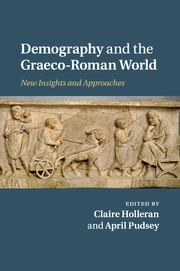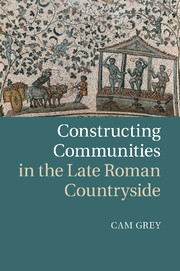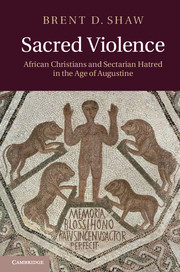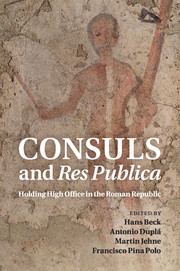Refine search
Actions for selected content:
23990 results in Ancient history
Chapter 6 - The Feriae Latinae as religious legitimation of the consuls’ imperium
- from Part II - Powers and functions of the consulship
-
-
- Book:
- Consuls and <I>Res Publica</I>
- Published online:
- 07 September 2011
- Print publication:
- 08 September 2011, pp 116-132
-
- Chapter
- Export citation
Bibliography
-
- Book:
- Consuls and <I>Res Publica</I>
- Published online:
- 07 September 2011
- Print publication:
- 08 September 2011, pp 336-367
-
- Chapter
- Export citation
Subject index
-
- Book:
- Consuls and <I>Res Publica</I>
- Published online:
- 07 September 2011
- Print publication:
- 08 September 2011, pp 374-376
-
- Chapter
- Export citation
Part IV - Ideology, confrontation and the end of the republican consulship
-
- Book:
- Consuls and <I>Res Publica</I>
- Published online:
- 07 September 2011
- Print publication:
- 08 September 2011, pp 257-258
-
- Chapter
- Export citation
Chapter 4 - Consular power and the Roman constitution: the case of imperium reconsidered
- from Part II - Powers and functions of the consulship
-
-
- Book:
- Consuls and <I>Res Publica</I>
- Published online:
- 07 September 2011
- Print publication:
- 08 September 2011, pp 77-96
-
- Chapter
- Export citation
Part II - Powers and functions of the consulship
-
- Book:
- Consuls and <I>Res Publica</I>
- Published online:
- 07 September 2011
- Print publication:
- 08 September 2011, pp 75-76
-
- Chapter
- Export citation
Chapter 1 - The magistrates of the early Roman republic
- from Part I - The creation of the consulship
-
-
- Book:
- Consuls and <I>Res Publica</I>
- Published online:
- 07 September 2011
- Print publication:
- 08 September 2011, pp 19-40
-
- Chapter
- Export citation
Index of persons
-
- Book:
- Consuls and <I>Res Publica</I>
- Published online:
- 07 September 2011
- Print publication:
- 08 September 2011, pp 368-373
-
- Chapter
- Export citation
Chapter 11 - Privata hospitia, beneficia publica? Consul(ar)s, local elite and Roman rule in Italy
- from Part III - Symbols, models, self-representation
-
-
- Book:
- Consuls and <I>Res Publica</I>
- Published online:
- 07 September 2011
- Print publication:
- 08 September 2011, pp 232-256
-
- Chapter
- Export citation
The republic and its highest office: some introductory remarks on the Roman consulate
-
-
- Book:
- Consuls and <I>Res Publica</I>
- Published online:
- 07 September 2011
- Print publication:
- 08 September 2011, pp 1-16
-
- Chapter
- Export citation
Chapter 2 - The origin of the consulship in Cassius Dio's Roman History
- from Part I - The creation of the consulship
-
-
- Book:
- Consuls and <I>Res Publica</I>
- Published online:
- 07 September 2011
- Print publication:
- 08 September 2011, pp 41-60
-
- Chapter
- Export citation
Chapter 15 - Consulship and consuls under Augustus
- from Part IV - Ideology, confrontation and the end of the republican consulship
-
-
- Book:
- Consuls and <I>Res Publica</I>
- Published online:
- 07 September 2011
- Print publication:
- 08 September 2011, pp 319-335
-
- Chapter
- Export citation
Contents
-
- Book:
- Consuls and <I>Res Publica</I>
- Published online:
- 07 September 2011
- Print publication:
- 08 September 2011, pp v-vi
-
- Chapter
- Export citation
Chapter 12 - Consular appeals to the army in 88 and 87: the locus of legitimacy in late-republican Rome
- from Part IV - Ideology, confrontation and the end of the republican consulship
-
-
- Book:
- Consuls and <I>Res Publica</I>
- Published online:
- 07 September 2011
- Print publication:
- 08 September 2011, pp 259-278
-
- Chapter
- Export citation
Chapter 9 - The consul(ar) as exemplum: Fabius Cunctator's paradoxical glory
- from Part III - Symbols, models, self-representation
-
-
- Book:
- Consuls and <I>Res Publica</I>
- Published online:
- 07 September 2011
- Print publication:
- 08 September 2011, pp 182-210
-
- Chapter
- Export citation
Frontmatter
-
- Book:
- Consuls and <I>Res Publica</I>
- Published online:
- 07 September 2011
- Print publication:
- 08 September 2011, pp i-iv
-
- Chapter
- Export citation

Demography and the Graeco-Roman World
- New Insights and Approaches
-
- Published online:
- 07 September 2011
- Print publication:
- 01 September 2011

Constructing Communities in the Late Roman Countryside
-
- Published online:
- 07 September 2011
- Print publication:
- 25 August 2011

Sacred Violence
- African Christians and Sectarian Hatred in the Age of Augustine
-
- Published online:
- 07 September 2011
- Print publication:
- 01 September 2011

Consuls and Res Publica
- Holding High Office in the Roman Republic
-
- Published online:
- 07 September 2011
- Print publication:
- 08 September 2011
